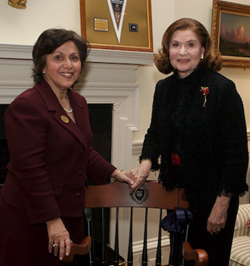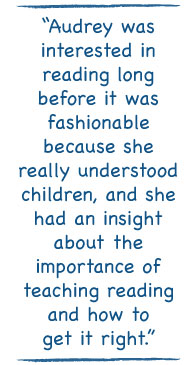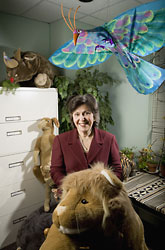Sally Shaywitz, M.D. Named the First Audrey G. Ratner Professor in Learning Development
March/April 2008 (Medicine@Yale newsletter, Volume 4/Issue 1)

Slow readers, creative thinkers: gift will spur dyslexia studies
New center will explore links between reading problems, creativity
Sally E. Shaywitz, M.D., professor of pediatrics at the School of Medicine and an internationally recognized authority on dyslexia, has been named the first Audrey G. Ratner Professor in Learning Development. The professorship was established with a $3 million family gift honoring Ratner’s lifelong interest in reading disorders.
 |
|
|
Sally E. Shaywitz, M.D.,
& Audrey G. Ratner |
|
In a 20-year research collaboration with her husband, Bennett A. Shaywitz, M.D., professor of pediatrics and neurology, Sally Shaywitz has made major contributions to gauging the prevalence of reading disorders and defining the brain systems responsible for dyslexia. She has also formulated practical strategies for dyslexic individuals and for policy makers to lessen dyslexia’s impact on educational and work success and on society at large. Shaywitz has summarized much of this work in Overcoming Dyslexia, a 2003 book written for the general public. Audrey Ratner, a former special-reading teacher, is the wife of Albert B. Ratner, co-chairman of the Cleveland-based real estate developer Forest City Enterprises.
Now an interior design consultant, Ratner first became interested in reading difficulties as a teacher at Chicago’s Francis W. Parker School, a day school founded in 1901 according to the progressive educational philosophies of John Dewey and Colonel Francis Wayland Parker. When Ratner arrived at the school, there was a strong alliance in place with Anna Gillingham, a pioneer educator and protègèe of Samuel T. Orton, M.D., the father of dyslexia research.
“From that experience, and throughout my life, I have maintained an interest in the teaching of reading and the challenges involved,” Ratner says. “I have discovered that an entire network of helpful ongoing research and teaching has developed around the world and I have long been aware  of the important work Sally Shaywitz and her husband, Bennett, were doing at Yale.”
of the important work Sally Shaywitz and her husband, Bennett, were doing at Yale.”
Ratner, an active volunteer in the Cleveland area, is mother to three children and two stepchildren, and a grandmother of 14. According to her daughter Karen Pritzker, of Branford, Conn., she plays the role of “education and reading maven” to family members and friends, giving counsel about spotting and accommodating learning disabilities, and peppering her advice with the facts about learning and learning styles that she has gleaned over years of classroom teaching, course work, and her own reading and research.
Says Sally Shaywitz, “Audrey was interested in reading long before it was fashionable because she really understood children, and she had an insight about the importance of teaching reading and how to get it right.”
 |
|
|
Children visiting Sally Shaywitz’s office at the Yale Center for Dyslexia and Creativity find a menagerie of stuffed animals and kites.
(From Medicine@Yale.) |
Shaywitz has championed the idea that the reading and spelling difficulties at the heart of dyslexia often occur in tandem with ingenious, imaginative, “out-of-the-box” thinking that dyslexic individuals can draw on to excel in educational and economic systems dominated by the printed word. In Overcoming Dyslexia, Shaywitz chronicled the lives of several creative and highly successful Americans with dyslexia, including best-selling novelist John Irving, Pulitzer Prize-winning playwright Wendy Wasserstein, and financial-services magnate Charles Schwab.
At the newly formed Yale Center for Dyslexia & Creativity (YCDC), Shaywitz and her colleagues are devising experiments and using brain-imaging techniques to explore these ideas scientifically, and she calls the Ratner Professorship an “anchoring gift” in support of these efforts. “This gift ensures that there will be an ongoing presence at Yale of scholars who are interested in these issues and who have made advancing the cause of dyslexic children and adults their focus,” Shaywitz says. “It links Yale with scholarship in dyslexia in a permanent way, and sends the message that a premier institution like Yale values people who are dyslexic and those who work in the field.”
In an age in which much of a child’s future is determined by high-stakes standardized written tests, Shaywitz says that she and her husband are gratified that their work has provided neurobiological evidence of the need for extra time for dyslexic individuals taking these tests. The Shaywitzes’ research has shown that a region on the left side of the back of the brain known as the word-form area operates less efficiently in dyslexic subjects than in normal readers. Neural circuits in this area allow normal readers to move from accuracy—reading a word correctly—to fluency, where these readers can simply look at a word and instantly know it. As many as one in five children, however, is dyslexic; they can learn to read accurately, Shaywitz says, but not fluently.
 “If you’re a good reader and you can use that word-form area well, you can look at a word and you’re on the express highway to reading. But if you’re a dyslexic, that route is blocked and you have to get off and take a ‘country road’—it’s circuitous, and it’s bumpy,” says Shaywitz. “You can get where you’re going, but it takes a lot longer. Just as a diabetic requires insulin, a dyslexic requires extra time.”
“If you’re a good reader and you can use that word-form area well, you can look at a word and you’re on the express highway to reading. But if you’re a dyslexic, that route is blocked and you have to get off and take a ‘country road’—it’s circuitous, and it’s bumpy,” says Shaywitz. “You can get where you’re going, but it takes a lot longer. Just as a diabetic requires insulin, a dyslexic requires extra time.”
 World-renowned heart surgeon Delos M. “Toby” Cosgrove, M.D. (photo at left), a dyslexic, is a case in point. Rejected by 12 out of the 13 medical schools to which he applied because of poor test scores, Cosgrove rose in the ranks of medicine to become CEO of The Cleveland Clinic, one of the world’s premier centers for health care. An acquaintance of both Shaywitz and Ratner, Cosgrove applauds the new Ratner Professorship as “honoring two outstanding women.” Cosgrove adds that Shaywitz’s pioneering research has done much to destigmatize dyslexia, spreading the word that people like him are “not dumb, just different.”
World-renowned heart surgeon Delos M. “Toby” Cosgrove, M.D. (photo at left), a dyslexic, is a case in point. Rejected by 12 out of the 13 medical schools to which he applied because of poor test scores, Cosgrove rose in the ranks of medicine to become CEO of The Cleveland Clinic, one of the world’s premier centers for health care. An acquaintance of both Shaywitz and Ratner, Cosgrove applauds the new Ratner Professorship as “honoring two outstanding women.” Cosgrove adds that Shaywitz’s pioneering research has done much to destigmatize dyslexia, spreading the word that people like him are “not dumb, just different.”
For Ratner, seeing Shaywitz named to the professorship established in her name is like completing a circle. “Helping a young person to achieve reading skills has been one of the most rewarding and fulfilling activities in my life,” Ratner says. “Sally Shaywitz has taken all that was known before her time and utilized all the technology of today with her expertise, love and devotion to the task. She is the Queen of Hearts.”
